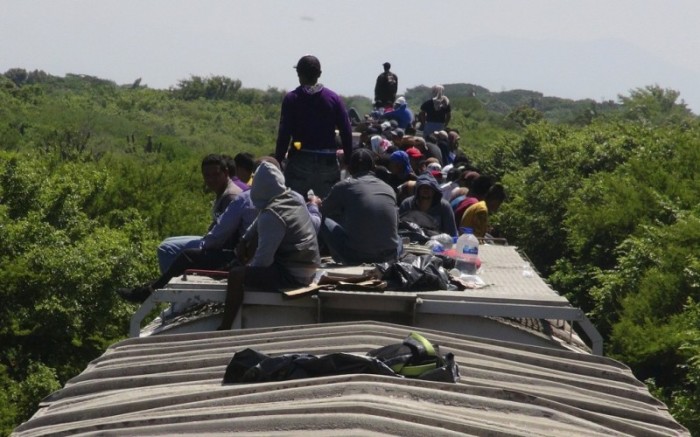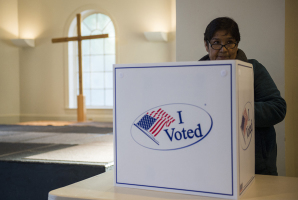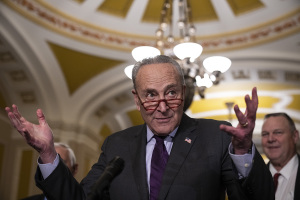Trump vs. Biden on 3 key issues important to Christian voters

Illegal immigration
One of President Trump's major campaign promises in 2016 was to address illegal immigration. During the 2016 campaign and after he was elected, Trump brought attention to the issue by sharing the stories of several angel families, those whose loved ones were murdered by immigrants who were in the U.S. illegally and weren't deported under previous administrations.
Part of his plan to slow down illegal immigration and human smuggling was to replace eroding existing border wall and to construct new border wall. So far, 341 miles of border wall has been constructed and over 516 miles of border wall has yet to be erected.
The Washington Times reported in August that new wall construction is being erected at a "rate of 10 miles a week," and federal funding has been allocated to complete more than 730 miles of the wall.
Nearly 1 million migrants were apprehended at the U.S. southern border in fiscal year 2019, which was an 88% increase from 2018. Among those numbers were 480,000 family units, 280,000 single adults, and 73,000 unaccompanied children.
While the number of illegal border crossings dropped to 400,000 in fiscal year 2020 (which ended in September), with April seeing a low of just over 16,000 apprehensions the first full month after the president declared an emergency at the border, crossings are again on the rise.
In September, according to figures released by U.S. Border Patrol to The Wall Street Journal, “Border Patrol agents caught 54,771 migrants crossing the U.S. border with Mexico last month and immediately expelled 48,327 of them, making it the busiest September at the border since 2006."
Trump also said he wanted to crack down on human trafficking. In September, the Department of Justice announced it will be providing $100 million in grants to support groups that assist victims of human trafficking. It also allocates funds to task forces across the country as well as local, state and tribal jurisdictions.
According to the White House: "More than 30% of women are sexually assaulted on the journey to our southern border," and "Nearly 70% of migrants traveling north to the United States are victims of violence."
"In 2018 alone, the Immigration and Customs Enforcement and Homeland Security Investigations made 1,588 human trafficking arrests and identified 308 victims. Of the 1,588 arrests, 1,543 were for sex trafficking violations," The White House said.
Trump has issued two executive orders to combat human trafficking. The first, signed on Feb. 9, 2017, was to disband transnational criminal organizations that traffic humans. The second, signed on Jan. 31, pertained to online child trafficking and sexual exploitation in the U.S.
During the four years of his first term in office, the president also signed nine pieces of legislation into law to help target human trafficking.
According to estimates, there are between 11 million and 14 million people living in the U.S. who entered the country illegally or have overstayed their visas. Among those numbers are some 700,000 temporary DACA recipients, those who were children when they were brought to the U.S. illegally and were younger than age 31 by June 15, 2012.
The temporary DACA program was enacted in 2012 by the Obama administration to allow those who were brought into the country as children to apply for a temporary two-year status that authorizes them to work. The protection lasts for two years at a time, and is renewable. At the time it was enacted, former President Barack Obama stressed: "this is not amnesty ... this is not a path to citizenship, it's not a permanent fix ..."
The Trump administration announced in 2017 that it intended to end the program. Trump said at the time he planned to do away with the program to push Congress to come up with a legislative fix, but Congress did not act.
In June, the U.S. Supreme Court ruled that the Trump administration cannot end the temporary DACA program, as it had planned.
Trump’s plan to rescind DACA drew the ire of not only those on the political left but also some evangelical Christian leaders, including those within the National Association of Evangelicals and the Rev. Samuel Rodriguez, president of the National Hispanic Christian Leadership Conference.
They argued that immigrants who came to the U.S. as children, most of whom know no other home since they grew up in the U.S., should not be punished for the actions of their parents.
In 2018, the Trump administration released a proposal to provide a pathway for citizenship to up to 1.8 million young immigrants living in the country illegally, including DACA recipients in exchange for $25 million toward the border wall and other changes to the immigration system. That plan, however, was opposed by House Speaker Nancy Pelosi, D-Calif., and members of the Congressional Hispanic Caucus.
According to the Biden campaign website, a Biden administration would not only put a stop to building a border wall within his first 100 days, but he would also give DACA recipients access to federal student loans, and create "a roadmap for citizenship" for the 11 million to 14 million immigrants who are living in the U.S. illegally.
Biden, who once supported having a barrier along the Southern border, now opposes border wall construction and said he would halt any remaining construction if he's elected president.
“There will not be another foot of wall constructed on my administration, No. 1,” Biden said during a virtual interview with NPR and other reporters from the National Association of Black Journalists and National Association of Hispanic Journalists back in August.
"I'm going to make sure that we have border protection, but it's going to be based on making sure that we use high-tech capacity to deal with it. And at the ports of entry — that's where all the bad stuff is happening," the former vice president added.
Back in 2006, then-Senator Biden supported funding for a 700-mile “secure fence,” along the U.S.-Mexico border, as did Sen. Chuck Schumer, D-N.Y., and then-Sens. Hillary Clinton, D-N.Y., and Barack Obama, D-Ill.
Like Trump, Biden said he wants Congress to pass comprehensive immigration reform, which it has failed to do under former Presidents George W. Bush, Barack Obama, and during the first four years of Trump's administration.
Biden also said in August that he plans to expand DACA and include protections for their parents. Biden also said he would look at reviving the Obama administration's DAPA program, even though it was struck down by the U.S. Supreme Court.
While the Obama administration was lauded for DACA, it was also blamed for causing family separation and criticized by immigration groups for deporting a historic number of immigrants.
Since launching his presidential run, Biden has faced criticism from immigrant rights advocates over Obama-era enforcement policies and his own voting record. Under the Obama administration, deportations were higher than they have been under Trump.
From 2009-2011, Immigration and Custom Enforcement deportations topped 385,000 each year "and hit a high of 409,849 in fiscal 2012," Axios reported.
The Obama administration was also criticized for detaining Central American asylum-seekers and their families and then "rush them through a fast-track court process and authorize raids to round up and deport migrants after they were ordered removed," Roll Call reported.
For his part, Biden has expressed regret for the high number of deportations under the Obama-Biden administration.
“The ‘deporter-in-chief’ moniker that Obama got, [Biden] was hit with that. He did admit recently that that [Obama-era] approach was a mistake — that was a departure,” said Muzaffar Chishti, a senior fellow and director of the Migration Policy Institute office at the New York University School of Law in an interview with Roll Call.
On Monday, the Supreme Court said it will take up two cases involving Trump's immigration policy. One is to grant hearings about the border wall construction, the other pertains to the administration's asylum policy, officially known as the Migrant Protection Protocols and more commonly called the “Remain in Mexico” policy.
The Remain in Mexico policy requires people from Central America to remain in Mexico while their asylum cases are being processed in the U.S. instead of allowing to live in the U.S. while their claims are being processed. This was done in an effort to deter migrants from making bogus asylum claims. It also reduced the migrant surge.
Biden has said that if he's elected, he will end the Remain in Mexico policy.
Melissa Barnhart contributed to this report




























